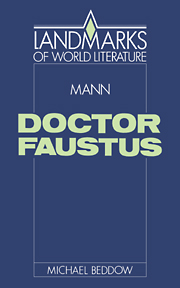5 - Reception
Published online by Cambridge University Press: 05 June 2012
Summary
A climate of resentment
On 31 August 1949 an item appeared in the Frankfurter Rundschau and a number of other German newspapers which will have a familiar ring to observers of the end of the GDR:
The town council of Marktredwitz has resolved in open session by nine votes to eight that a street named after the writer Thomas Mann should be renamed Goethestrafie. A spokesman for the council, explaining this measure, said that since the war … Thomas Mann had behaved with a lack of piety towards his German fatherland. He was blatantly devoid of true inner culture [Herzensbildung] and his lack of friendliness towards Germany had left the council no other choice.
Such antics in a Bavarian Titipu would hardly concern us, were it not for the glimpse they provide of the rancorous climate in which Thomas Mann in general, and Doctor Faustus in particular, were received in defeated Germany. For received Thomas Mann certainly was: a study by Gerhard Roloff, Exil und Exilliteratur in der deutschen Presse 1945–49 (Worms, 1976) shows that, in a representative selection of newspapers and periodicals published in Germany in the first five post-war years, Mann was mentioned much more frequently than any other exiled artist or intellectual. Roloff's results for the ten most frequently mentioned names merit presentation in graphical form (Figure 1). Equally revealing when charted are Roloff's figures for the distribution of press references to Thomas Mann across the five-year period (Figure 2).
Information
- Type
- Chapter
- Information
- Mann: Doctor Faustus , pp. 97 - 104Publisher: Cambridge University PressPrint publication year: 1994
